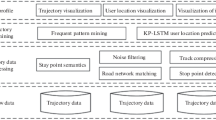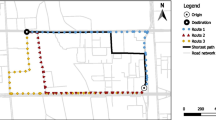Abstract
With increasing popularity of mobile devices and flourish of social networks, a large number of trajectory data is accumulated. Trajectory data contains a wealth of information, including spatiality, time series, and other external descriptive attributes (i.e., travelling mode, activities, etc.). Trajectory recommendation is especially important to users for finding the routes meeting the user’s travel needs quickly. Most existing trajectory recommendation works return the same route to different users given an origin and a destination. However, the users’ behavior preferences can be learned from users’ historical multi-attributes trajectories. In this paper, we propose two novel personalized trajectory recommendation methods, i.e., user behavior probability learning based on matrix decomposition and user behavior probability learning based on Kernel density estimation. We transform the route recommendation problem to a shortest path problem employing Bayesian probability model. Combining the user input (i.e., an origin and a destination), the trajectory query is performed on a behavior graph based on the learned behavior probability automatically. Finally, a series of experiments on two real datasets validate the effectiveness of our proposed methods.
Similar content being viewed by others
Explore related subjects
Discover the latest articles and news from researchers in related subjects, suggested using machine learning.References
Hu J, Yang B, Guo C, Jensen C S, Xiong H. Stochastic origin-destination matrix forecasting using dual-stage graph convolutional, recurrent neural networks. In: Proceedings of the 36th international Conference on Data Engineering. 2020, 1417–1428
Yang K, Ding X, Zhang Y, Chen L, Gao Y. Distributed similarity queries in metric spaces. Data Science and Engineering, 2019, 4(2): 93–108
Zheng B, Su H, Hua W, Zheng K, Zhou X, Li G. Efficient clue-based route search on road networks. IEEE Transactions on Knowledge Data Engineering, 2017, 29(9): 1846–1859
Zhao L, Mao J, Pu M, Liu G, Chai H. Automatic calibration of road intersection topology using trajectories, In: Proceedings of the 36th International Conference on Data Engineering. 2020, 1633–1644
Gionis A, Lappas T, Pelechrinis K, Terzi E. Customized tour recommendations in urban areas. In: Proceedings of the 7th ACM international conference on Web search and data mining. 2014, 313–322
Gao H, Liu H. Data analysis on location based social networks. Computational Social Sciences book series, 2013
Li G, Sun L, Zhang Z, Ji P, Yu P S. MC2: unsupervised multiple social network alignment. In: Proceedings of the International Conference on Bigdata. 2008, 1151–1156
Delling D, Goldverg A V, Pajor T, Werneck R F. Customizable route planning in road networks. In: Proceedings of the 10th International Symposium on Experimental Algorithms. 2011, 376–387
Dai J, Liu C, Xu J, Ding Z. On personalized and sequenced route planning. Journal of World Wide Web, 2016, 19: 679–705
Chen C, Chen X, Wang Z, Wang Y, Zhang D. ScenicPlanner: planning scenic travel routes leveraging heterogeneous user-generated digital footprints. Front of Computer Science, 2017, 11(1): 61–74
Xu J, Chen J, Zhou R, Fang J, Liu C. On workflow aware location-based service composition for personal trip planning. Future generation computer systems, 2019, 98: 274–285
Zheng K, Zhao Y, Lian D, Zheng B, Zhou X. Reference-based framework for spatio-temporal trajectory compression and query processing. IEEE Transactions on Knowledge Data Engineering, 2020, 32(11): 2227–2240
Lim K H, Chan J, Leckie C, Karunasekera S. Personalized tour recommendation based on user interests and points of interest visit durations. In: Proceedings of the 24th International Conference on Artificial Intelligence. 2015, 1778–1784
Wan L, Hong Y, Huang Z, Peng X, Li R. A hybrid ensemble learning method for tourist route recommendations based on geo-tagged social networks. International Journal of Geographical Information Science, 2018: 1–22
Zhu X, Hao R, Chi H, Du X. FineRoute: personalized and time-aware route recommendation based on check-ins. IEEE Transactions on Vehicular Technology, 2017, 66(11): 10461–10469
Chen W, Zhao L, Xu J, Liu G, Zheng K, Zhou X. Trip oriented search on activity trajectory. Journal of Computer Science and Technology, 2015, 30(4): 745–761
Chen L, Cong G, Jensen C S, Wu D M. Spatial keyword query processing: an experimental evaluation. In: proceedings of the VLDB Endowment. 2013, 6(3): 217–228
Cong G, Jensen C S. Querying geo-textual data: spatial keyword queries and beyond. In: proceedings of SIGMOD. 2016: 2207–2212
Pan X, Ang M, Zhang J, Wu L. Approximate similarity measurements on multi-attributes trajectories data. IEEE Access, 2019(7): 10905–10915
Pan X, Nie S, Hu H, Yu P S, Guo J. Reverse nearest neighbor search in semantic trajectories for Location based Services, IEEE Transactions on Services Computing, 2020, DOI: https://doi.org/10.1109/TSC.2020.2968309
Liu H, Xu J, Zheng K, Liu C, Xian W. Semantic-aware query processing for activity trajectory. In: Proceedings of the Tenth ACM International Conference on Web Search and Data Mining. 2017, 283–292
Kurashima T, Iwata T, Irie G, Fujimura K. Travel route recommendation using geotags in photo sharing sites. In: Proceedings of the Conference on Information and Knowledge Management. 2010, 579–588
Liu S, Wang S. Trajectory community discovery and recommendation by multi-source diffusion modeling. IEEE Transactions on Knowledge and Data Engineering, 2017, 29(4): 898–911
Bao J, Zheng Y, Wilkie D, Mokbel M. Recommendations in location-based social networks: a survey. GeoInformatica, 2015, 19(3): 525–565
Lian D, Zhao C, Xie X, Sun G, Chen E, Rui Y. GeoMF: joint geographical modeling and matrix factorization for point-of-interest recommendation. In: Proceedings of the 20th ACM SIGKDD international conference on Knowledge discovery and data mining. 2014, 831–840
Ogundele T J, Chow C Y, Zhang J D. SoCaST: exploiting social, categorical and spatio-temporal preferences for personalized event recommendations. In: Proceedings of 14th International Conference on International Symposium on Pervasive Systems. 2017, 38–45
Yuan Q, Cong G, Sun A. Graph-based point-of-interest recommendation with geographical and temporal influences. In: Proceedings of Conference on Information and Knowledge Management. 2014, 659–668
Zhang J, Chow C Y. GeoSoCa: exploiting geographical, social and categorical correlations for point-of-interest recommendations categories and subject descriptors. In: Proceedings of the 38th International ACM SIGIR Conference on Research and Development in Information Retrieval. 2015, 443–452
Baraglia R, Muntean C I, Nardini F M, Silvestri F. LearNext: learning to predict tourists movements. In: proceedings of Conference on Information and Knowledge Management. 2013, 751–756
Liu Q, Wu S, Wang L, Tan T. Predicting the next location: a recurrent model with spatial and temporal contexts. In: Proceedings of the Thirtieth AAAI Conference on Artificial Intelligence. 2016, 194–200
Qiao S, Shen D, Wang X, Han N, Zhu W. A self-adaptive parameter selection trajectory prediction approach via hidden markov models. IEEE Transactions on Intelligent Transportation Systems, 2015, 16(1): 284–296
Zhang W, Wang J. Location and time aware social collaborative retrieval for new successive point-of-interest recommendation. In: Proceedings of Conference on Information and Knowledge Management. 2015, 1221–1230
He J, Qi J, Ramamohanarao K. A joint context-aware embedding for trip recommendations. In: proceedings of IEEE International Conference on Data Engineering. 2019, 292–303
Hu Q, Wang M, Li Q. Urban hot spot and commercial area exploration with check-in data. Acta Geodaetica Et Cartographica Sinica, 2014, 43(3): 314–321
Yuan J, Zheng Y, Xie X. Discovering regions of different functions in a city using human mobility and POIs. In: Proceedings of ACM International Conference on Knowledge Discovery and Data Mining. 2012, 186–194
Jing Y, Jiang W, Su G, Zhou Z, Wang Y. A learning automata-based singular value decomposition and its application in recommendation system. In: Proceedings of International Conference on Intelligent Computing. 2014: 26–32
Cui G, Luo J, Wang X. Personalized travel route recommendation using collaborative filtering based on GPS trajectories. International Journal of Digital Earth, 2017: 1–24
Huang X, Zhao W, Wang B, Lv H, Yang M. Recommendation system and deep learning. Tsinghua University Press, 2018: 42–101
Silverman B W. Density estimation for statistics and data analysis. Chapman and Hall, 1986
Wei L Y, Zheng Y, Peng W C. Constructing popular routes from uncertain trajectories. In: Proceedings of 18th ACM International Conference on Knowledge Discovery and Data Mining. 2012, 195–203
Chen D W, Ong C S, Xie L X. Learning points and routes to recommend trajectories. In: Proceedings of the 25th ACM International on Conference on Information and Knowledge Management. 2016, 2227–2232
Sommer C. Shortest-path queries in static networks. ACM Computing Surveys, 2014, 46(4): 31
Vaira G, Kurasova O. Parallel Bidirectional Dijkstra’s Shortest Path Algorithm. In: Proceedings of Conference on Databases & Information Systems Vi: Selected Papers from the Ninth International Baltic Conference. 2011, 422–435
Acknowledgements
This work was partially supported by the grant from the Natural Science Foundation of Hebei Province (F2021210005), the Hebei Province Innovation Capability Improvement Plan (21550803D), the Outstanding Youth Foundation of Hebei Education Department (BJ2021085), the Fourth Outstanding Youth Foundation of Shijiazhuang Tiedao University, and Training Project for Improving Students of Scientific and Technological Innovation Ability for College and Middle School (DXS202106), Scientific Research Project from China Railway Corporation (2020F026).
Author information
Authors and Affiliations
Corresponding author
Additional information
Xiao Pan is an associate professor in Shijiazhuang Tiedao University. China. She received her PhD degree from Renmin University of China, China. Her research interests include data management, mobilecomputing and privacy-aware computing. She is a member of the Database Society of the China Computer Federation (CCF DBS).
Lei Wu is a lecturer at Shijiazhuang Tiedao University, and is a PhD candidate at Yanshan University. China. His research interests include spatial-temporal data management and mining.
Fenjie Long is a professor in Shijiazhuang Tiedao University. China. He received his PhD degree from Peking University, China. He served as a visiting scholar in The City University of New York, USA in 2012. His research interest is the urbanization and urban problems.
Ang Ma received the Master degree and BS degree from Shijiazhuang Tiedao University, China in 2019 and 2016, respectively. Her research interests include data mining and mobile computing.
Electronic supplementary material
Rights and permissions
About this article
Cite this article
Pan, X., Wu, L., Long, F. et al. Exploiting user behavior learning for personalized trajectory recommendations. Front. Comput. Sci. 16, 163610 (2022). https://doi.org/10.1007/s11704-020-0243-2
Received:
Accepted:
Published:
DOI: https://doi.org/10.1007/s11704-020-0243-2




